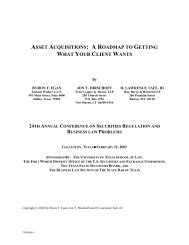fiduciary duty issues in m&a transactions - Jackson Walker LLP
fiduciary duty issues in m&a transactions - Jackson Walker LLP
fiduciary duty issues in m&a transactions - Jackson Walker LLP
You also want an ePaper? Increase the reach of your titles
YUMPU automatically turns print PDFs into web optimized ePapers that Google loves.
and commented that (i) the <strong>duty</strong> of obedience requires a director to avoid committ<strong>in</strong>g ultra viresacts, i.e., acts beyond the scope of the authority of the corporation as def<strong>in</strong>ed by its articles of<strong>in</strong>corporation or the laws of the state of <strong>in</strong>corporation, (ii) the <strong>duty</strong> of loyalty dictates that adirector must act <strong>in</strong> good faith and must not allow his personal <strong>in</strong>terests to prevail over the<strong>in</strong>terests of the corporation, and (iii) the <strong>duty</strong> of due care requires that a director must handle hiscorporate duties with such care as an ord<strong>in</strong>arily prudent man would use under similarcircumstances. 22 Good faith under Gearhart is an element of the <strong>duty</strong> of loyalty. Gearhartrema<strong>in</strong>s the sem<strong>in</strong>al case for def<strong>in</strong><strong>in</strong>g the <strong>fiduciary</strong> duties of directors <strong>in</strong> Texas, although thereare subsequent cases that amplify Gearhart as they apply it <strong>in</strong> the context of lawsuits by theFederal Deposit Insurance Corporation (“FDIC”) and the Resolution Trust Company (“RTC”)aris<strong>in</strong>g out of failed f<strong>in</strong>ancial <strong>in</strong>stitutions. 23 Many Texas <strong>fiduciary</strong> <strong>duty</strong> cases arise <strong>in</strong> the contextof closely held corporations. 241. Loyalty.a. Good Faith.The <strong>duty</strong> of loyalty <strong>in</strong> Texas is a <strong>duty</strong> that dictates that the director act <strong>in</strong> good faith andnot allow his personal <strong>in</strong>terest to prevail over that of the corporation. 25 The good faith of adirector will be determ<strong>in</strong>ed on whether the director acted with an <strong>in</strong>tent to confer a benefit to thecorporation. 26 Whether there exists a personal <strong>in</strong>terest by the director will be a question of fact. 27b. Self-Deal<strong>in</strong>g Transactions.In general, a director will not be permitted to derive a personal profit or advantage at theexpense of the corporation and must act solely with an eye to the best <strong>in</strong>terest of the corporation,unhampered by any pecuniary <strong>in</strong>terest of his own. 28 The court <strong>in</strong> Gearhart summarized Texaslaw with respect to the question of whether a director is “<strong>in</strong>terested” <strong>in</strong> the context of self-deal<strong>in</strong>g<strong>transactions</strong>:A director is considered “<strong>in</strong>terested” if he or she (1) makes a personal profit froma transaction by deal<strong>in</strong>g with the corporation or usurps a corporate opportunity. . .; (2) buys or sells assets of the corporation . . .; (3) transacts bus<strong>in</strong>ess <strong>in</strong> his22232425262728Gearhart, 741 F.2d at 719-721; McCollum v. Dollar, 213 S.W. 259 (Tex. Comm’n App. 1919, hold<strong>in</strong>g approved); seeLandon v. S & H Market<strong>in</strong>g Group, Inc., 82 S.W.3d 666 (Tex. App.—Eastland 2002), which quoted and repeated thesummary of Texas <strong>fiduciary</strong> <strong>duty</strong> pr<strong>in</strong>ciples from Gearhart.Floyd v. Hefner, 2006 WL 2844245 (S.D. Tex. Sept. 29, 2006); see FDIC v. Harr<strong>in</strong>gton, 844 F. Supp. 300 (N.D. Tex.1994).See Flanary v. Mills, 150 S.W.3d 785 (Tex. App. – Aust<strong>in</strong> 2004) (uncle and nephew <strong>in</strong>corporated 50%/50% ownedroof<strong>in</strong>g bus<strong>in</strong>ess, but never issued stock certificates or had board or shareholder meet<strong>in</strong>gs; uncle used corporation’sbank<strong>in</strong>g account as his own, told nephew bus<strong>in</strong>ess do<strong>in</strong>g poorly and sent check to nephew for $7,500 as his share ofproceeds of bus<strong>in</strong>ess for four years; court held uncle liable for breach of <strong>fiduciary</strong> duties that we would label loyaltyand candor.)Gearhart, 741 F.2d at 719.International Bankers Life Insurance Co. v. Holloway, 368 S.W.2d 567 (Tex. 1967), <strong>in</strong> which the court <strong>in</strong>dicated thatgood faith conduct requires a show<strong>in</strong>g that the directors had “an <strong>in</strong>tent to confer a benefit to the corporation.”Id. at 578.A. Copeland Enterprises, 706 F. Supp. at 1291; Milam v. Cooper Co., 258 S.W.2d 953 (Tex. Civ. App. — Waco 1953,writ ref’d n.r.e.); see Kendrick, The Interested Director <strong>in</strong> Texas, 21 Sw. L.J. 794 (1967).5446095v.18
















